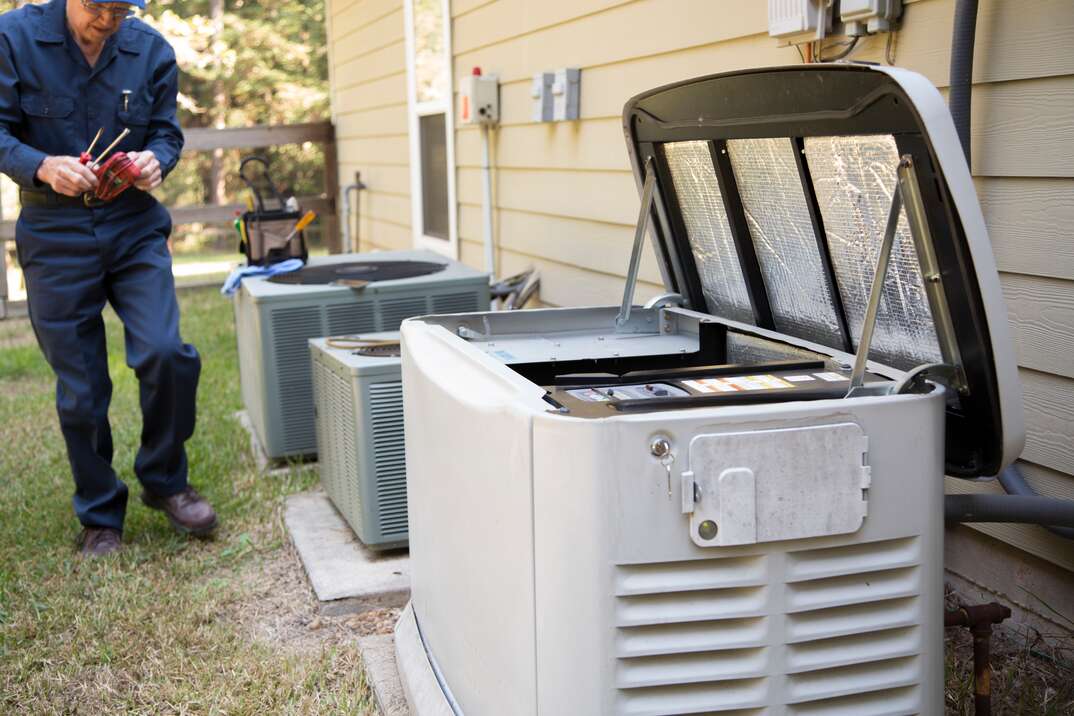What Size Generator Do I Need?

If you've ever experienced a prolonged power outage, you'll already know how much inconvenience it can cause. While areas prone to tornadoes and other extreme weather events can have power outages lasting days or weeks, even a short power cut can lead to spoiled freezer food and bring your household to a grinding halt.
A home generator is an excellent investment for any home at risk of power supply issues because it can keep your essential appliances and systems functioning during an outage. However, the sheer number of products on the market can make choosing a generator confusing.
How Are Generators Sized?
Generators come with a kilowatt (kW) rating describing how many watts they can power. There are 1,000 watts in a kilowatt, so a 20-kilowatt generator can power appliances requiring a combined maximum of 20,000 watts.
According to Consumer Reports, home generators fall into three main categories.
- Mid-sized inverters (2,000-3,500 watts): Can power plug-in appliances but are usually unsuitable for powering HVAC systems and pumps
- Home standby generators (5,000 to 7,500 watts): Provide enough power to run all your usual household appliances, including wired-in units such as air conditioners and furnaces
- Large inverters (up to 8,500 watts): Produce enough energy to power lights, essential appliances and smaller HVAC systems
You can also purchase small, portable inverters designed for powering small plug-in items like phone chargers. However, most models only power appliances up to 2,000 watts, so they're unlikely to be suitable for most households.
Choosing the right generator size is essential if you lose power for long periods. On the other hand, you don't want to waste money on an enormous generator you barely ever use. The tips below can help you determine precisely what size generator you need during an outage.
How to Find Your Wattage Needs
The most accurate way to calculate what size generator you need is to find the total wattage of every appliance you need in a blackout. Most household appliances have the wattage listed in the user manual or printed on the device casing.
Some appliances have an ampere rating instead of a wattage. However, you can convert this figure to watts by multiplying the amperes by the voltage (volts x amps = watts). Therefore, a 12-amp appliance using 120 volts will require 1,440 watts (12 x 120 = 1,440).
Calculate the total running watts of your appliances. You'll then need to divide the result by 1,000 to convert watts into kilowatts. For example, if your appliances require 5,000 watts, this converts to 5 kilowatts.
How to Choose the Right Generator Size
Knowing how many watts your appliances need makes choosing a home generator pretty straightforward. However, it's wise to choose a generator that can deliver slightly more power than you think you need. Motor-driven appliances often cause a surge when you turn them on, which means they draw a lot more energy than usual for a few seconds. Examples of these types of appliances include air conditioners and sump pumps.
The General Services Administration recommends choosing a generator running at 50% to 80% of its maximum capacity when you run all your appliances simultaneously. For example, if your calculations show you need a 10-kilowatt generator, you'll likely be better off with a 12.5-kilowatt generator or even a 20-kilowatt generator to avoid overloads.
More Related Articles
- How Do I Tell If an Electrical Issue Is Serious?
- Can One Bad Outlet Affect Others?
- How to Reset a GFCI Outlet
- What’s in My Electrician’s Van?
- 7 Ways to Save on Your Electric Bill
Other Factors to Consider
When choosing a home generator, a key factor is the frequency and duration of power outages where you live. If you live in an area prone to severe weather, where power outages can last for days, it makes sense to purchase a pricier wired-in home standby generator so your home can keep running as usual. It could also be a good option if extreme temperatures in your area pose a risk if your HVAC system is out of action.
However, purchasing a generator that can power every appliance in your home isn't necessarily the right option if power outages are a brief or rare occurrence. Powerful generators typically cost more, particularly if your model requires wiring in. Therefore, you might decide you can manage with the bare essentials, such as keeping your refrigerator and lights running until the power outage ends. In this situation, a mid-sized inverter could be a more cost-effective solution.
Elocal Editorial Content is for educational and entertainment purposes only. Editorial Content should not be used as a substitute for advice from a licensed professional in your state reviewing your issue. Systems, equipment, issues and circumstances vary. Follow the manufacturer's safety precautions. The opinions, beliefs and viewpoints expressed by the eLocal Editorial Team and other third-party content providers do not necessarily reflect the opinions, beliefs and viewpoints of eLocal or its affiliate companies. Use of the Blog is subject to the
Website Terms and Conditions.The eLocal Editorial Team operates independently of eLocal USA's marketing and sales decisions.



